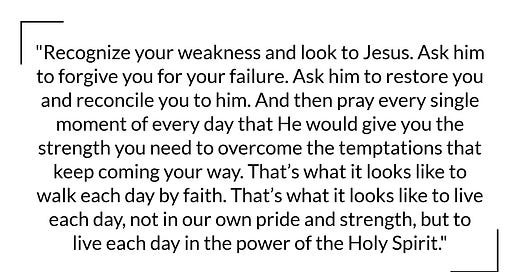
Submission & Honor
[Read 1 Peter 3:1-7]
What is your purpose in life? That’s a question that people have been pondering and discussing for thousands of years. Whether people know it or not, everyone is searching for their purpose in life to some degree. We want to know our lives have meaning. We want to know our lives have a purpose. So, we search for it.
Yet, as our nation—and world—has rejected God more and more, it’s been much more difficult to find purpose and there’s been much more meaninglessness. You know why? Because you can’t have purpose without design. You cannot have something that is randomly thrown together and say that it has purpose. It may be useful, but it does not have purpose. In order for something to have purpose, it has to be created and designed to accomplish something—it’s purpose.
So, as our world increasingly walks away from God, and we see purposelessness and meaninglessness increasing, we also find people trying to come up with ways to help. I am regularly hearing people talking about “coming up with your own purpose.” We need to create our own purpose in the world. Maybe we need to decide that our purpose in the world is to be good to people. Maybe we need to decide that our purpose in the world is to be rich and powerful. Maybe we need to decide that our purpose is to spread positivity and encouragement.
Yet, take a moment to think about it. Can something that was created determine its purpose? Can the pot say to the potter that it has decided its purpose will be to function as a plate? Can the bicycle say to its creator that it has decided its purpose is to fly? It’s nonsensical. Yet, we hear people talking about this all the time. We even find ourselves slipping into believing it ourselves at times.
We know that God has created us and designed us with purpose. So, if we want to know what our purpose is in the world, we need to turn to Him to find out. Doesn’t that make sense? If the pot wants to know what its purpose is, it should ask the potter? So, we need to turn to God’s Word to determine what our purpose is in the world.
When we turn to scripture, we find one overwhelming answer. Our purpose in the world is to glorify God. In Colossians we read, “And whatever you do, whether in word or deed, do it all in the name of the Lord Jesus, giving thanks to God the Father through him.” (Colossians 3:17, NIV). In 1 Corinthians we read, “So whether you eat or drink or whatever you do, do it all for the glory of God.” (1 Corinthians 10:31, NIV). Whatever you are doing… That’s pretty comprehensive, isn’t it? Every aspect of your life should be directed here. Every ounce of your energy should be funneled into this channel. The Glory of God. That’s our purpose in life.
The Westminster Catechism—another catechism that was written about a hundred years after the Heidelberg—starts with this question, “What is the chief end of man?” Another way of saying that is, “What is the purpose of humanity?” It answers the question by saying, “[Our purpose is] to glorify God and enjoy Him forever.”
Once we understand this, it has to change the way we live. Now we finally understand why we were created. We were created to glorify God—to make Him look beautiful and glorious and great. We are called to accomplish that purpose in everything we do—whether we are working on a factory line, whether we are shopping in a grocery store, whether we are at home with our families.
That’s why Peter makes this comment in the previous chapter: “Dear friends, I urge you, as foreigners and exiles, to abstain from sinful desires, which wage war against your soul. Live such good lives among the pagans that, though they accuse you of doing wrong, they may see your good deeds and glorify God on the day he visits us.” (1 Peter 2:11–12, NIV). Our sinful nature does not want to glorify God. Our sinful desires don’t naturally flow in this direction. So, Peter tells us that we need to abstain from our sinful desires which wage war against our soul—that are killing us. We need to live in this world—surrounded by people who believe different things than us—in a way that glorifies God and causes God’s name to be glorified by those around us. This is the purpose of our lives.
After making this important statement—setting up the next few passages—Peter begins to tell us what that looks like. This is really important because it’s easy to grasp the concept of glorifying God in all our lives, but it’s much more difficult to know what that looks like in everyday life. So, Peter begins to tell us what that looks like. Last week, he told us that submitting to authorities—even unjust authorities—brought glory to God. This week he begins to show us how to glorify God in our marriages.
Now, as we dive into this passage, it’s important to understand that this is connected with 1 Peter 2:11-12. These verses at the beginning of chapter three aren’t stand alone. That’s why the NIV has the words “in the same way” in verses 3:1 and 3:7—as a way to show that these commands are connected to everything that comes before it. Peter is still showing the church how to fulfill their purpose in the world—how to glorify God in their marriages.
At the core of this passage, we could boil down the principles of 1 Peter 3:1-7 and combine them with 1 Peter 2:11-12 and they would say something like this: “Wives, abstain from sinful desires, which wage war against your soul. Live with your husbands in such a way that the non-believers around you will glorify God when they see your life. Husbands, abstain from sinful desires, which wage war against your soul. Live with your wives in such a way that the non-believers around you will glorify God when they see your life.” That’s the core principle of this passage. It’s about glorifying God by the way we interact with our spouses.
Once again, I find 1 Peter to be extremely relevant to our current situation. Peter is writing to a group of people who are suffering and he has to talk about how husbands and wives should interact with one another. Do you think that’s relevant right now? Of course it is. We’re living in a situation where families have been cooped up with one another for two months—feeling “trapped,” “cabin fever,” you name it. Moms and Dads have been trying to find creative ways to work from home. Kids have been trying to figure out how to do their school from home. Everyone is trying to get things done and everyone is in everyone’s way and everyone is annoying everyone just a little bit. Do you think there’s tension in homes right now? Of course there is!
Then add to that, the fact that we are living in the midst of a pandemic—a crisis of sorts—that is wearing on people. Everyone I talk to is getting tired and worn out from this thing. And guess what happens as we get tired and worn out? Our emotions begin rising to the surface more. We all get a little more moody. Little things begin to make us collapse in despair or erupt in anger. Our emotions feel like they are walking tightrope, balancing on a thin line, almost falling off one side or the other.
So, you’ve got a group of people trying to get things done, crammed in a space together, their emotions on edge, tensions increasing. Do you think it’s important for us to be reminded of how we are supposed to interact with our spouses during this time? Do you think most of us are struggling to interact with our spouses in a way that brings glory to God? Probably.
On the flip side, this is a tremendous opportunity to show the world what it looks like to be a Christian spouse. In the midst of suffering, Christians have a greater opportunity to show the world what it means to follow Christ. While marriages and families are struggling around us, we have an opportunity to glorify God in a powerful way by listening to Him and following Him. We can fulfill our purpose in the world in new and powerful ways in the midst of suffering.
So, what does Peter have to say about how we glorify God in our marriages? He begins by talking to wives. He says, “Wives, in the same way submit yourselves to your own husbands so that, if any of them do not believe the word, they may be won over without words by the behavior of their wives, when they see the purity and reverence of your lives.” (1 Peter 3:1–2, NIV). Well, that’s not a popular thing to say, is it? Yet, before we dive into talking about wives submitting to husbands, let’s look at a couple other things. We’ll get back to it in a bit.
Besides glorifying God, why does Peter tell wives to submit themselves to their husbands? So that they would eventually turn to Christ and be saved. Peter is talking to wives who are married to men who do not know Jesus—who don’t follow Him nor trust Him. He tells them to interact with their husbands in a way that leads them to Christ WITHOUT A WORD. That’s really powerful.
So, as they live a God-glorifying life with their husband, the possibility of their husband glorifying God with his life also increases. Why? Because this is the way we were all created to live! There’s something powerfully attractive to fulfilling your purpose. Things finally click. They fit. Things begin to make sense more. So, when a husband sees his wife living the way she was created to live, it stirs something in his heart and draws him to Jesus.
Peter goes on to say, “Your beauty should not come from outward adornment, such as elaborate hairstyles and the wearing of gold jewelry or fine clothes. Rather, it should be that of your inner self, the unfading beauty of a gentle and quiet spirit, which is of great worth in God’s sight. For this is the way the holy women of the past who put their hope in God used to adorn themselves.” (1 Peter 3:3–5, NIV). The point Peter is getting at in this passage is that “inner beauty” in of greater worth in God’s sight than “outer beauty.” He’s not saying that all outer beauty is bad. He’s actually following the Proverb that says, “Like a gold ring in a pig’s snout is a beautiful woman who shows no discretion.” (Proverbs 11:22, NIV). You are not called to put your emphasis and energy on these external beauties. You are to put your energy and emphasis into an inner beauty that brings glory to God—a gentle and quiet spirit.
Sure, the world around you is dolling themselves up to the hilt. Sure, the world is spending money like crazy trying to make themselves look good on the outside. Don’t fall into that trap. Focus on developing an inner beauty that glorifies God and causes other people to glorify God—like your husband.
Peter ends this section speaking to wives this way, “They submitted themselves to their own husbands, like Sarah, who obeyed Abraham and called him her lord. You are her daughters if you do what is right and do not give way to fear.” (1 Peter 3:5–6, NIV).
I wanted to end here—and talk about submission here—because I think it helps us understand a good balance of what submission looks like from a wife. People have been working really hard over the past twenty or thirty years to explain these passages away. Some people really don’t want the Bible to say that wives are supposed to submit to their husbands. But it does. It does it over and over again. You can’t get away from it and you can’t try to explain it away. The way wives are to glorify God—and express God’s glory to the world around them—is by submitting to their husbands.
Yet, this submission is not what some think it is. Listen to this passage again from the ESV: “For this is how the holy women who hoped in God used to adorn themselves, by submitting to their own husbands, as Sarah obeyed Abraham, calling him lord. And you are her children, if you do good and do not fear anything that is frightening.” (1 Peter 3:5–6, ESV). So, submit to your husbands and FEAR NOTHING. Do you catch that important nuance? This is not speaking about wives walking around with their heads down, in a beaten up, torn down, defeated sort of submission. That’s never what the bible means by submission. It means a fearless woman, who loves her God more than anything, and loves her husband deeply, and submits to his leadership in the home. Not slavishly, but willingly. Not fearfully, but joyfully. In order to glorify God in your marriage—and help the world around you glorify God—Wives develop an inner beauty that is quiet, gently, submissive, and fearless as you live with your husbands.
Then Peter turns to the husbands: “Likewise, husbands, live with your wives in an understanding way, showing honor to the woman as the weaker vessel, since they are heirs with you of the grace of life, so that your prayers may not be hindered.” (1 Peter 3:7, ESV). Husbands are to glorify God by understanding their wives and honoring their wives.
When Peter talks about understanding our wives, he isn't just talking about being understanding with them. He’s talking about understanding them. Getting to know them deeply, intimately. Understand who they are. Get to know them. Know what makes them happy and what makes them angry. Know what gives them joy and pleasure. This knowledge is to be used in caring for her. Once you know what makes her angry and frustrated, stop doing it! Once you know what brings her joy and pleasure, do it more often! It’s your job to take care of her—to love her and serve her like a real leader. So, make sure you know her.
Peter also says husbands are supposed to honor their wives. He gives two reasons. One reason is that they are physically weaker than they are. I realize that’s not popular to say anymore, but it’s generally true. Men are generally physically stronger than women. They were created this way for a reason—to protect, not dominate. So, Peter reminds the husbands of this fact. You’re stronger than her so that you can protect and honor her.
He also tells husbands to honor their wives because they are fellow heirs with Christ. They are brothers and sisters in Christ. So, husbands are to honor their wives because they have equal value in Christ.
That’s really important to see and understand in this passage. The Bible never tells wives to submit to their husbands because they are “less than” their husbands. The Bible never tells wives to submit to their husbands because they have less value than their husbands. It tells them to submit to their husbands because God told them to and because that’s the role God has given them to fulfill in the world.
The Bible also continually reminds husbands of this fact. Being a Christian Husband and leader in your home is not about being a domineering jerk, telling your wife to make you a sandwich. She has equal value in God’s sight. You need to honor her and love her and serve her as Christ has served the church. Your job is not to “put her in her place” or to “tear her down,” because if you do that your prayers may be hindered. Your job is to lift her up and honor her—to help the world see her at Christ sees her. That’s how you glorify God by loving your wife—by understanding her and honoring her.
To say all of this bluntly, the basic principle of Christian marriage is: Get over yourself and love your spouse. Wives, God has put you on this earth to bring Him glory and honor, and he has told you that you can do that by focusing on developing an inner beauty: a quiet, gentle, submissive, fearless spirit. Husbands, God has put you on this earth to bring Him glory and honor, and he has told you can do that by focusing on understanding and honoring your wife. You have been called to love your wife as Christ loved the church and give yourself up for her.
People of God, in time of difficulty like this, these principles are more important than ever. Yet, it is harder to do these things right now. But if we don't live this way, we will collapse and fall apart. This is how we were created to live. So, if you’ve failed in living this way, don’t fall into despair. Look to Christ, repent and receive forgiveness. Then ask for the Holy Spirit to empower you to live the way God has called you to live. You will begin to fulfill your purpose. You will begin to glorify God with your life—with your marriage—and the world around you will begin to notice and glorify God too.









